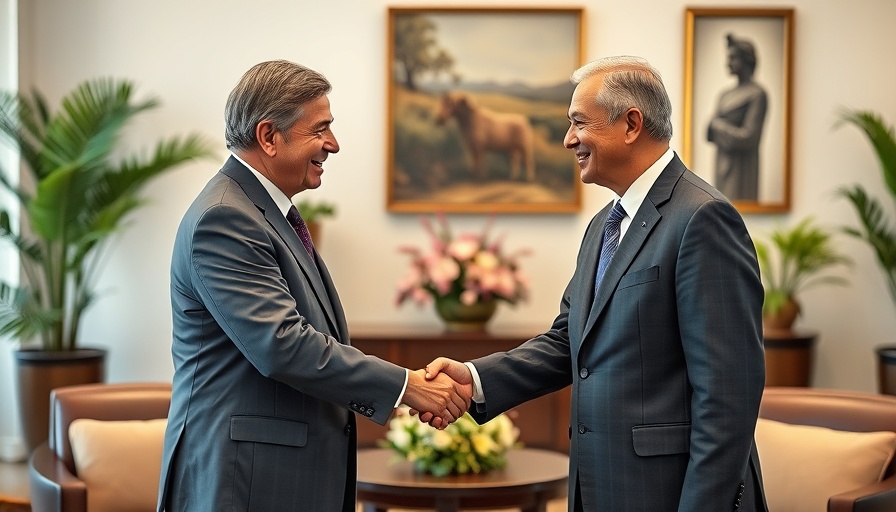
China and India: Two Giants Looking to Rebuild Ties
This weekend, India's Prime Minister Narendra Modi is making a significant visit to China, aiming for a fresh start in the traditionally fraught relationship between the two countries. At a time when both nations are grappling with the economic repercussions of U.S. tariffs, their leaders are strategically looking to enhance ties. The stakes are high, as India faces 50% tariffs on goods headed for the U.S., a direct consequence of its oil purchases from Russia. Meanwhile, China's economy is also challenged by these tariffs, prompting leaders from both sides to reevaluate their cooperation.
The Economic Implications of a Stronger Relationship
While India and China are the second and fifth largest economies in the world, they share a complex and competitive history. Economic projections suggest that India could soon surpass Japan, making it the third-largest economy by 2028. A stable and cooperative relationship between these neighboring giants could reshape global economic dynamics significantly.
As noted by Qian Liu of Wusawa Advisory, there’s a need for greater focus on Sino-Indian relations beyond the typical U.S.-China lens. This shift could cultivate a robust business partnership, expanding trade and shared opportunities for economic growth.
The Shadow of Historical Tensions
Despite these economic possibilities, tensions remain palpably high. The roots of distrust trace back to unresolved territorial disputes and a violent confrontation in 2020, which greatly strained diplomatic relations. Such incidents have led to a halt in Chinese investments in India and restrictions on various Chinese apps, demonstrating how quickly tensions can translate into economic fallout.
Experts argue that it’s crucial for both nations to reestablish dialogue. Antoine Levesques, a senior fellow focused on defense strategies, emphasizes the importance of communication in managing not just their bilateral relationship, but also their roles in the wider Asian context. Other critical issues such as Tibet and water disputes add layers of complexity to their interactions.
A Path Forward: The Role of Dialogue
In light of these challenges, the upcoming talks between Modi and Xi are not just symbolic; they are essential to paving a path for mutual understanding and collaboration. Enhancing communication may not only address existing tensions but can also help create frameworks for fruitful economic partnerships that benefit both countries.
The international community is watching closely, as the outcomes of the Modi-Xi relationship could influence geopolitical stability across Asia. Better ties may lead to cooperative initiatives that could play a pivotal role in addressing common challenges such as climate change and trade imbalances.
Global Perspective on U.S.-China-India Relations
The dynamics among these three powers cannot be overlooked. As U.S.-China relations feel the pressures of trade wars and technology races, India’s position as a potential ally demonstrates its growing global significance. Moreover, India's approach of non-alignment during Cold War politics has morphed into a more strategic balancing act in the modern geopolitical landscape.
Economic cooperation between India and China could provide a counterbalance to U.S. hegemony and shift global trade paradigms, further emphasizing the importance of their meeting this weekend.
The Stakes for the Global Economy
The ramifications of a closer India-China relationship extend beyond their borders. If both countries successfully navigate their differences and foster cooperation, it could lead to increased stability in Asia and positively influence global markets.
Their collaboration can also serve as a model for other nations facing similar geopolitical tensions – showcasing the power of diplomacy in resolving conflicts and driving shared growth.
Final Thoughts: The Imperative of Collaboration
Ultimately, the meeting between Modi and Xi symbolizes more than just a bid to improve bilateral ties; it reflects the broader necessity for nations to unite amid economic uncertainty. As the global landscape continues to evolve, India and China's potential partnership may become an essential component of a more interconnected and resilient world economy.
The outcomes from this strategic meeting could be crucial not just for India and China, but for the international community at large as global dynamics shift and develop.
Stay informed about the latest developments in world news and international relations as these two countries take steps towards constructive dialogue and collaboration. Understanding the importance of their relationship is essential for anyone interested in the geopolitics shaping today’s world.
 Add Row
Add Row  Add
Add 




Write A Comment